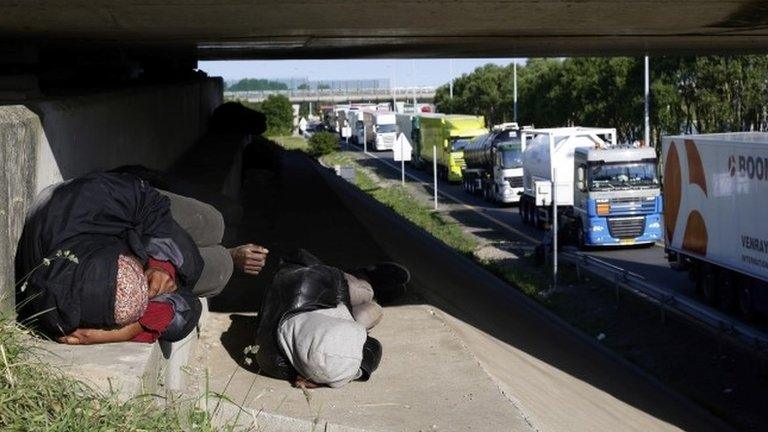Calais migrants: UK to create lorry 'secure zone'
- Published
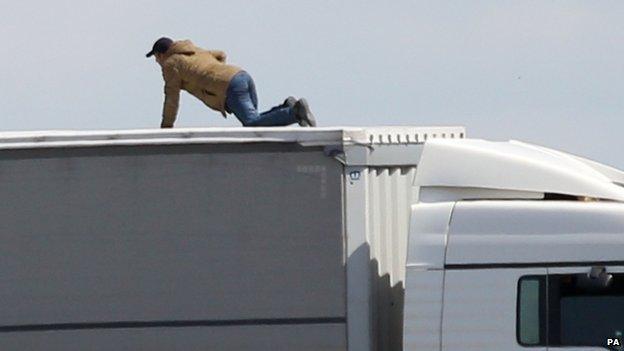
It is hoped the secure zone will help stop migrants' attempts to board lorries
A new "secure zone" will be created at Calais for UK-bound lorries in a bid to stop migrants boarding them, Home Secretary Theresa May has announced.
The area will hold up to 230 vehicles - in effect a two-and-a-half mile queue.
Mrs May said 8,000 migrant attempts to cross the Channel to the UK were foiled between 21 June and 11 July, when ferry strikes in France exacerbated problems.
Transport bosses said migrant numbers in Calais had risen from 600 in January to 5,000 - and that figure was growing.
'Repeated attempts'
Mrs May told the Commons hauliers had been subjected to "repeated attempts by illegal migrants who attempt to stow themselves away in their vehicles".
The new zone should provide protection for lorries and their drivers by "removing them from the open road where they can become targets for migrants", said Mrs May.
She said the security zone should "transform protection" for hauliers.
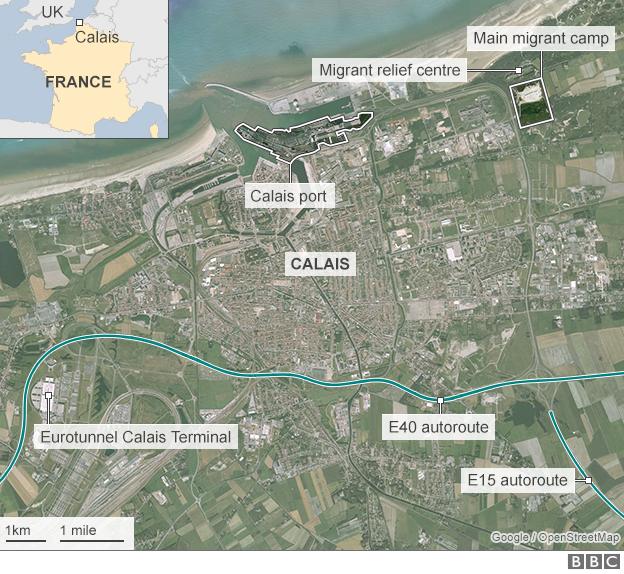
Her announcement came as transport bosses appeared before the Home Affairs Committee to answer questions about the crisis.
Kent Police Chief Constable Alan Pughsley told MPs there had been a "significant increase" in the number of migrants found hiding in vehicles in the UK over the past month.
He said:
From 1 January to 31 May, 26 people were found
In the five weeks from 1 June, 405 people were found
"At the peak" on 8 July, 96 people were found
There are estimated to be 5,000 migrants currently in Calais, and that number is "rising"
Mr Pughsley said he believed strike action by French ferry workers during that time was a "contributing factor" to the numbers because it meant "easier access" for people to trains or lorries.
John Keefe, Director of Public Affairs at Eurotunnel, said the increase in migrant numbers was ''a crisis''
John Keefe, director of public affairs at Eurotunnel, said the 5,000 figure had grown from an estimated 600 migrants in January, and the rise was "continuing apace".
"We have never seen numbers like this before and we have not in the past seen the degree of organisation that goes with the numbers either," he said.
He said a secure zone would not solve the issue, adding: "As soon as you remove an opportunity, the organised criminals who are managing the migrant attacks are moving to the next opportunity - to the next weak spot."
Ahmed asked for £1,200 to be wired to London or Kabul
Road Haulage Association chief executive Richard Burnett said the situation was "out of control" and criticised the fact the secure zone would not be in place until the autumn.
"This isn't fast enough. We've got drivers being threatened with bars and knives. We've had an example of a driver being threatened with a gun," he said.
"We've got a problem right now. This is unprecedented and it's escalating. We need action now."
The "write-off" of products due to contamination by migrants entering vehicles could be £1bn a year, he said, adding: "There are full loads that are being destroyed."
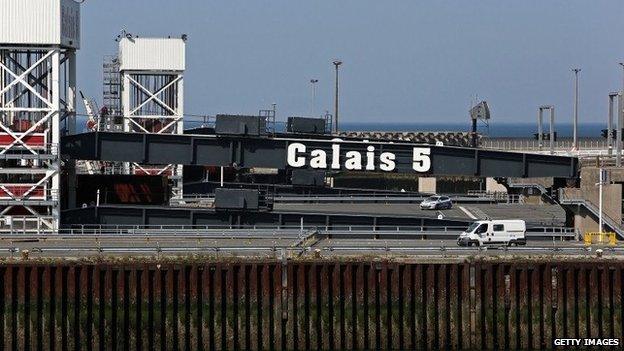
British and French authorities have been working together improve security
Last week a migrant from Eritrea died attempting to board a freight shuttle headed to Britain. The death came days after about 150 migrants tried to storm the Channel Tunnel terminal in France.
The strike by French ferry workers at the end of last month forced the suspension of Channel Tunnel services. It closed the Port of Calais and resulted in thousands of lorry drivers being stuck on the roads into Calais. This led hundreds of migrants to try to board UK-bound lorries.
Mrs May said British and French authorities had been working together for months to improve security at Calais.
Some £12m will spent on work to reinforce security in northern French ports, including new fencing and work to improve traffic flow and Border Force controls, which would be completed next month, she said.
Other security measures already announced include a £2m upgrade of detection technology, £1m extra for dog searches and new fencing in Calais.
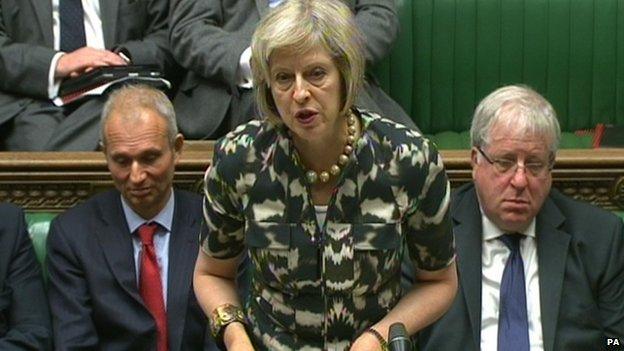
Home Secretary Theresa May revealed the secure zone measure in a Commons statement
UKIP's migration spokesman, Steven Woolfe, said the government was "waking up to the crisis" but called for more UK border personnel in Calais and said the UK should negotiate a scheme where migrants can be returned immediately to France if they have entered the UK illegally.
Shadow home secretary Yvette Cooper said Britain's border was the scene of a "terrible crisis" where lives were being lost and people were being injured.
- Published14 July 2015
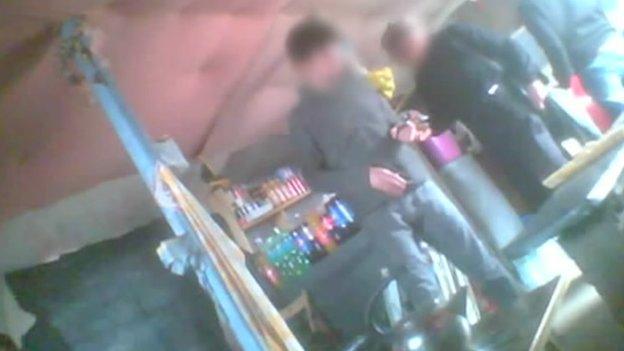
- Published14 July 2015
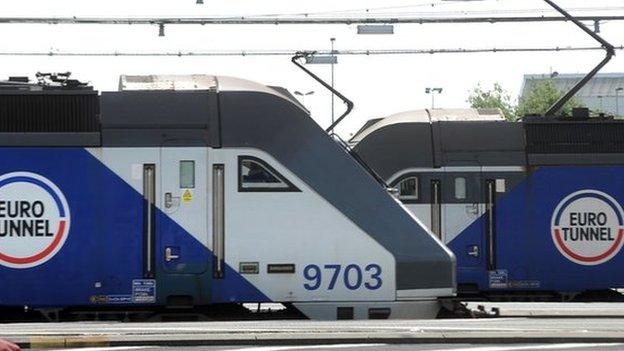
- Published7 July 2015
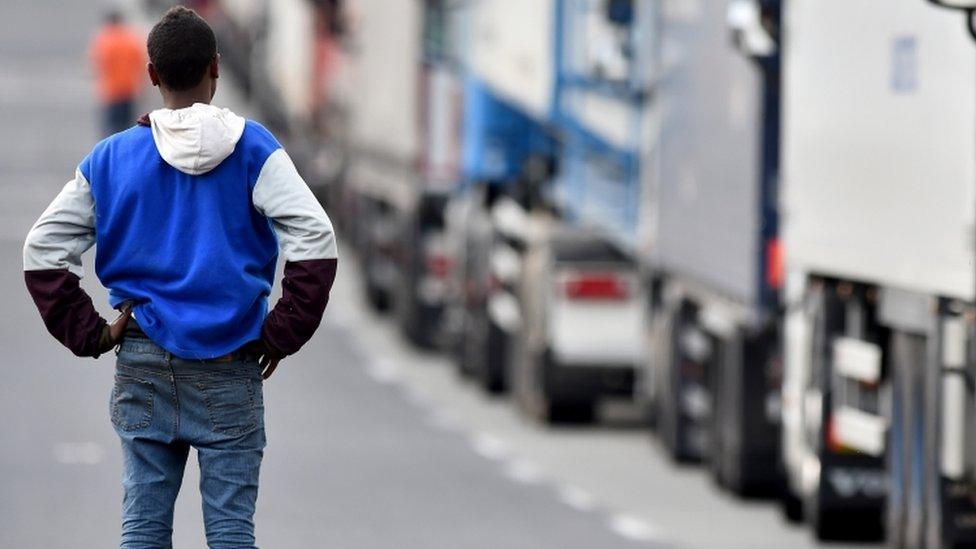
- Published4 July 2015
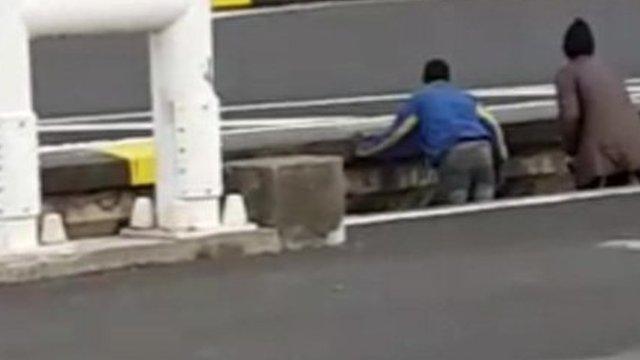
- Published24 June 2015
